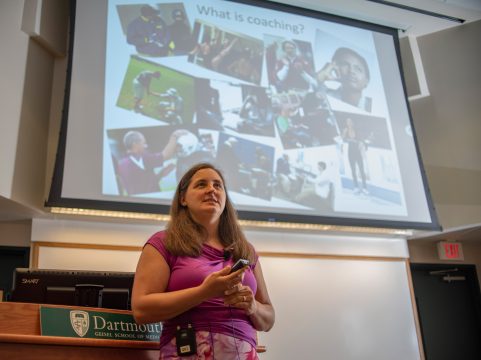To better help students navigate the challenges of medical school and support their professional development, the Geisel School of Medicine began replacing its longstanding advising system with a new longitudinal coaching program for incoming first-year students at the start of the 2019 academic year.
Historically, the advising system consisted of two Geisel faculty advisors supporting all medical students. The new coaching program utilizes 23 faculty members who each coach small groups of students. The longitudinal relationship of medical students with a faculty coach for the duration of their studies, encourages close rapport between students and their coach to maintain consistent academic and professional support. Through small group and individual coaching sessions, the program aims to improve student support for enculturation into the medical profession in the domains of wellbeing, professional identity development, and academic planning. Coaches also provide a key link to other academic and support services at Geisel.
Out of an interest in understanding if coaching was meeting student needs, a cohort of fourth-year medical students (now alumni)—Julia Berkowitz MED ’20, Bianca Di Cocco MED ’20, Reza Hessabi MED ’20, Alexander Kettering MED ’20, Devanshi Mehta MED ’20, and Christiaan Rees MED ’20, Guarini ’18—initiated a quality improvement project.

Working with Kimberly Gifford, MD, assistant professor of pediatrics and director of the coaching program, and Nick Ryan, director of accreditation and the Kern program, the assessment team identified areas of keen interest, including student relationships with their coach/advisor and whether there are differing needs for self-identified underrepresented minority (URM) students as opposed to non-URM students, and if so, are the coaches/advisors meeting those needs.
Gifford says the students chose an important topic and their findings will help the coaching program to better support the needs of URM students. “I have worked with many groups over the years and theirs has been one of the best,” she says. “They worked collaboratively and efficiently and gave each other kudos.”
The team developed an anonymous brief survey with an open-ended comment section that they sent to first- and second-year medical students—questions related to race and ethnicity, whether it is important to share a racial identity or ethnicity with their coach (for second year students) or advisor (for first year students) and their overall experience.
With a response rate of 70 percent, results revealed little difference between the value URM and non-URM first-year students place on the importance of ethnicity or race in identifying with their coach. However, for second-year students under the advising system, URM students felt it was important to racially or ethnically identify with their advisor more than non-URM students did. And while the project did not aim to evaluate the overall effectiveness of the coaching program, some of the findings pointed to its positive impact.
“It’s hard to know whether that can be attributed to variation in one class to another or a differential allocation of funding to the traditional advising program or coaching program,” Rees explains. “But beyond that, all of the metrics we looked at evaluating quality and student perception of the coaching program were off the charts for first-year students—there was a high degree of satisfaction with the program.”
Di Cocco says the survey elicited narrative comments that echo students’ satisfaction with both the coaching program and their connection to their coach. “URM first-year students did indicate they wanted a coach or advisor to be aware of the general issues or obstacles they face, though they didn’t need to be directly connected to a coach that identified similarly. They also wanted their coach to have an available network or database of faculty who identified as URM so they could make those connections.”
Also noted in the comments was the lack of diversity in the Upper Valley and Dartmouth communities when compared to the U.S., which Mehta says is important to acknowledge—how this affects URM students and the challenges they face, is something that needs to be addressed by the program.
“It is important to us that students play a key role in shaping the coaching program, so having this group lead this project was essential and we are grateful for their interest in doing so,” Ryan says. “The result of their work provides important context and insight about student coaching needs and impressions of the coaching program. It has been a real pleasure to support this group and their research.”
Gifford agrees. “Their approach to this project and their work as a group is evidence that they will all make great contributions to medicine throughout their careers.”
A special thanks to the Kern Family Foundation for its support of this Coaching Program through their grant to the Kern National Network. The Kern National Network for Caring and Character in Medicine was realized in partnership and with support from the Kern family, the Robert D. and Patricia E. Kern Family Foundation, and Steve and Shelagh Roell. Their support will help the Kern National Network expand and inspire additional partners with a shared vision for building a new foundation for medical education.